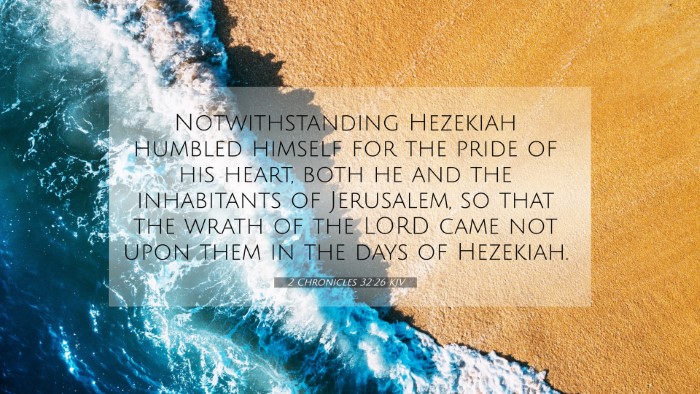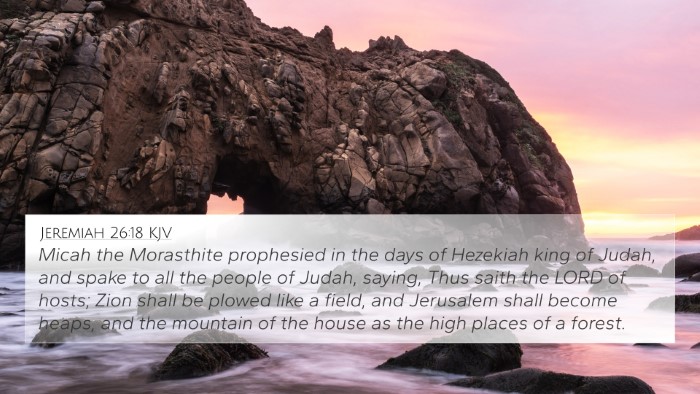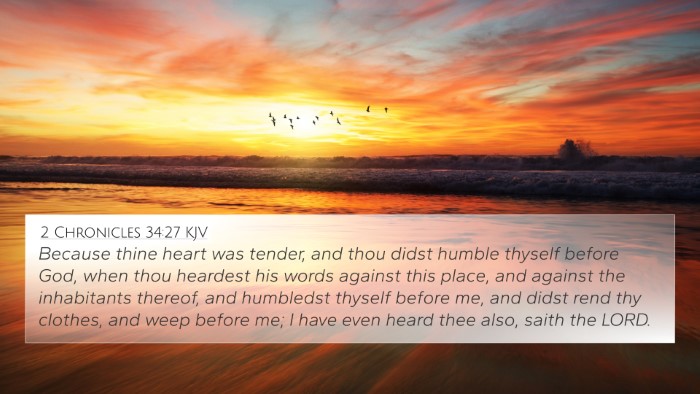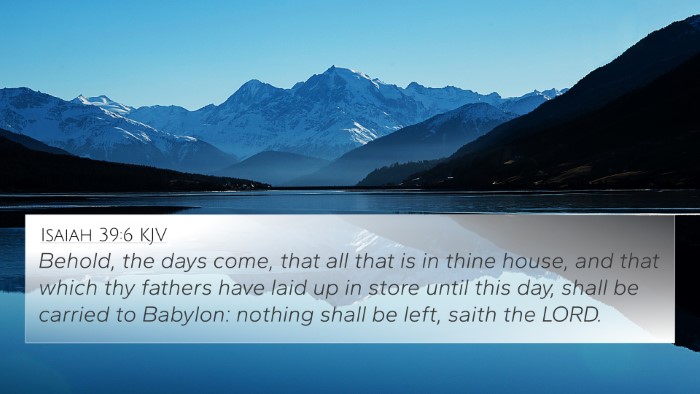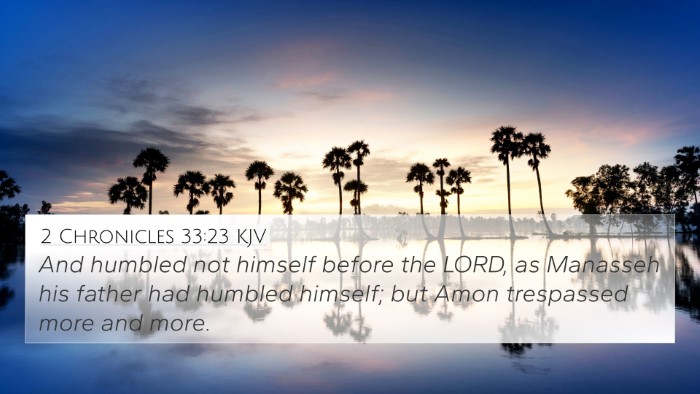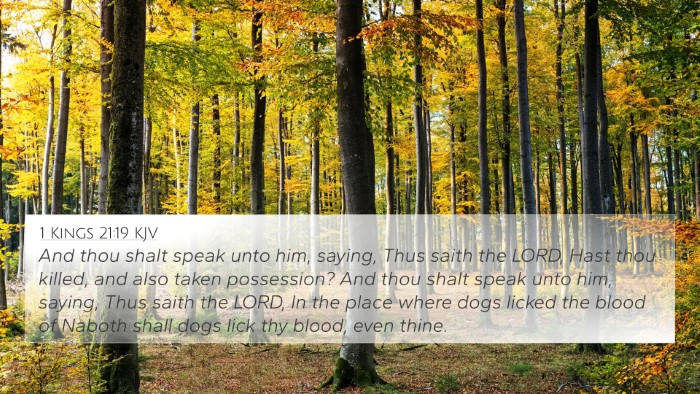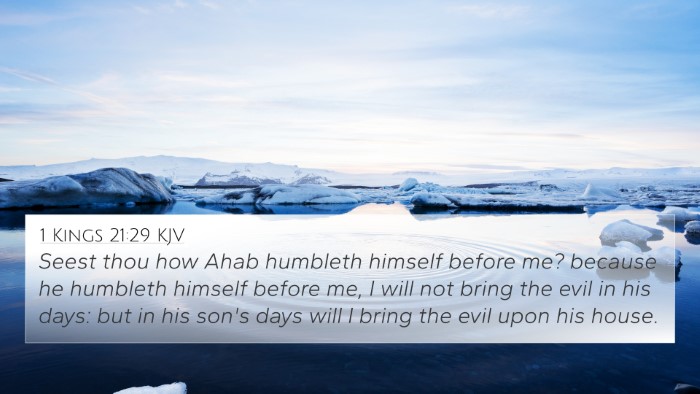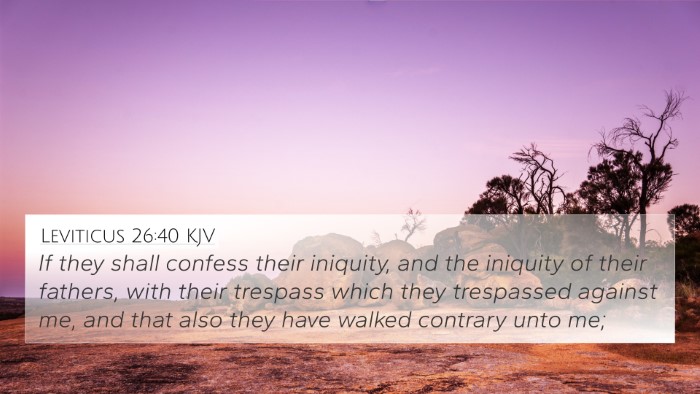Understanding 2 Chronicles 32:26
Bible Verse: 2 Chronicles 32:26: “Notwithstanding, Hezekiah humbled himself for the pride of his heart, both he and the inhabitants of Jerusalem, so that the wrath of the LORD came not upon them in the days of Hezekiah.”
Overview
This verse highlights a pivotal moment in the life of King Hezekiah of Judah, showcasing his humility and leadership during a critical time. The narrative indicates a response to a dire situation—Hezekiah’s appeal to God, which led to averted disaster for Jerusalem.
Meaning and Interpretation
The significance of this verse can be better appreciated through insights provided by various public domain commentaries.
-
Matthew Henry's Commentary:
Henry emphasizes the importance of humility in the face of pride. He notes that Hezekiah, despite being a great king who had seen God's deliverance, understood the gravity of pride and its repercussions. His humble response not only affected him but also impacted the people of Jerusalem, leading to a collective turning away from pride into a state of humility before the LORD.
-
Albert Barnes' Notes:
Barnes takes this opportunity to reflect on the character of Hezekiah, noting that true repentance is often marked by humility. He expresses that Hezekiah's actions represented a significant turning point where the king, instead of leading his people into arrogance following victories, opted to lead them in humility, acknowledging their dependence on God.
-
Adam Clarke's Commentary:
Clarke discusses the notion of divine wrath being withheld due to Hezekiah’s humility. He identifies that the king's acknowledgment of pride and consequent repentance prevented calamity. Clarke points out this humility as a model for personal and national repentance which mitigates impending judgment.
Cross-References
This verse is interconnected with several other scriptures highlighting similar themes of humility, repentance, and divine mercy:
- 2 Chronicles 7:14: “If my people, which are called by my name, shall humble themselves, and pray, and seek my face, and turn from their wicked ways; then will I hear from heaven, and will forgive their sin, and will heal their land.”
- James 4:10: “Humble yourselves in the sight of the Lord, and he shall lift you up.”
- 2 Kings 19:1: “And it came to pass, when king Hezekiah heard it, that he rent his clothes, and covered himself with sackcloth, and went into the house of the LORD.”
- Psalms 34:18: “The LORD is nigh unto them that are of a broken heart; and saveth such as be of a contrite spirit.”
- Isaiah 57:15: “For thus saith the high and lofty One that inhabiteth eternity, whose name is Holy; I dwell in the high and holy place, with him also that is of a contrite and humble spirit, to revive the spirit of the humble, and to revive the heart of the contrite ones.”
- Proverbs 3:34: “Surely he scorneth the scorners: but he giveth grace unto the lowly.”
- Luke 14:11: “For whosoever exalteth himself shall be abased; and he that humbleth himself shall be exalted.”
Thematic Connections
This verse, along with its cross-references, forms a rich tapestry of biblical themes surrounding humility, repentance, and divine mercy. As one delves into the connections between Bible verses, it becomes apparent that humility is a recurring theme that resonates across both the Old and New Testaments.
Inter-Biblical Dialogue
The interactions and thematic similarities between these verses provide deeper insights for a comparative Bible verse analysis:
- The contrast of pride and humility is echoed in both the historical context of Hezekiah and the teachings of Jesus.
- Understanding the connection between Hezekiah’s repentance and New Testament principles of humility can help in interpreting biblical themes cohesively.
- This verse serves as a reminder of the importance of maintaining a humble heart in all of life’s circumstances, as echoed across scripture.
Conclusion
In summary, 2 Chronicles 32:26 reflects a profound truth about the nature of humility in the face of divine authority. The verse, in conjunction with other related scriptures, teaches readers to recognize the power of humility and the importance of acknowledging one’s dependence on God. The collective insights from Matthew Henry, Albert Barnes, and Adam Clarke enrich our understanding of how linking Bible scriptures can lead to more profound spiritual insight and life application.
As you explore these connections, consider using tools for Bible cross-referencing such as concordances or cross-reference guides, enhancing your personal study and understanding of the scriptures.


